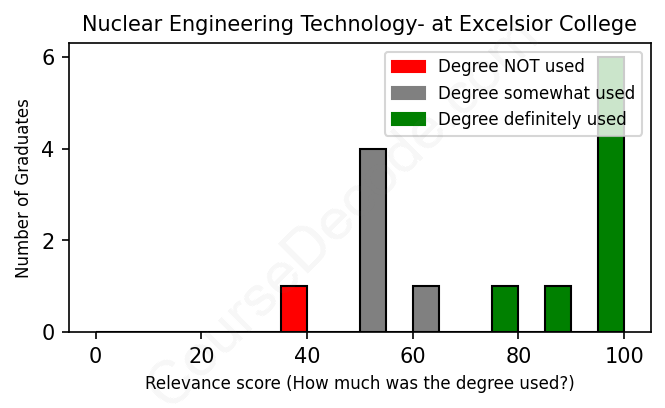
First, some facts. Of the Nuclear Engineering Technology- graduates from Excelsior College we've analyzed , here's how many have used (or NOT used) their degree in their career:

These are estimates based on AI analysis of 14 LinkedIn profiles (see below).
The verdict? Above average. Overall, with an average relevance score of 76%, Nuclear Engineering Technology- graduates from Excelsior College have a higher likelihood (+9%) of finding work in this field compared to the average graduate across all fields:
And for comparison, here's the chart for all profiles we've looked at across all degrees.
Also, after graduating, only 14% of these graduates have pursued further education other than another Bachelor's degree (such as a Masters degree or other), compared to the average across all profiles of 35%. This suggests a Bachelors degree is enough for most Nuclear Engineering Technology- graduates, and it's normal to look for work straight after graduation.
See the details:
|
Relevance score: 50% We think this person has gone into a career only somewhat relevant to their degree. We think this person has gone into a career only somewhat relevant to their degree.
DEGREE INFOGraduated in 2021 from Excelsior College with a Bachelor of Science in Nuclear Engineering Technology-. No other secondary education since. JOB HISTORY SINCE GRADUATIONMechanic Operator DuPont Apr 2022 - Present ABOUTBS in Nuclear Engineering Technology. U.S. Naval Nuclear Propulsion Program Veteran. Active TS/SCI clearance. ASSE 6005, 6040 |
The top 10 most common jobs done by the graduates we've analyzed (ranked most common to least) are:
From analyzing LinkedIn profiles of people with a Nuclear Engineering Technology degree from Excelsior College, it's clear that many graduates have found their way into roles that are closely related to the field, with a notable concentration in positions like Nuclear Reactor Operators, Radiation Protection Engineers, and various technician roles. These jobs typically draw on the specialized skills and knowledge related to nuclear systems and safety that are pivotal to their degree. For instance, positions like Nuclear Reactor Operator at PSEG and Senior Radiation Protection Engineer at Pacific Gas and Electric Company are direct applications of what they studied, highlighting a strong relevance to their educational background.
However, not every job these graduates have taken is directly tied to nuclear engineering technology. Some positions, such as Central Control Room Operator or even roles involving project management or technical instruction, tend to veer away from core nuclear principles. While they may utilize some transferable skills, they're not fully aligned with the core competencies of the Nuclear Engineering Technology degree. Overall, it's a mixed bag: while many have successfully moved into relevant roles, others have found themselves in jobs that, while using some related skills, don’t fundamentally connect to the nuclear field they initially trained for. This shows that there are pathways both inside and outside the specialized career course that this degree could lead to.
Here is a visual representation of the most common words in job titles for Nuclear Engineering Technology- graduates (this is across all Nuclear Engineering Technology- graduates we've analyzed, not just those who went to Excelsior College):

It looks like graduates from the Nuclear Engineering Technology program at Excelsior College have generally followed solid career paths that are quite relevant to their field. Many of them land roles in the nuclear sector right after graduation, often starting as operators, engineers, or technicians at reputable companies such as Dominion, Pacific Gas and Electric, and Talen Energy. Their first roles are often in operational or engineering capacities, which are directly linked to their studies. For example, graduates from 2019 and 2020 moved quickly into positions as nuclear reactor operators and plant operators, showcasing an immediate application of their skills in the industry.
As we look at their trajectories five or ten years later, it’s clear that many graduates have continued to climb the ladder in nuclear engineering and related fields. For instance, those who started as operators often shift into supervisory or specialized roles, like the Senior Radiation Protection Engineer or the Supervisory Health Physicist positions. Some have even branched out into more managerial or unique roles, like project management and even owning businesses. While there are a few instances of graduates veering off into roles that are perhaps less directly related to nuclear engineering—like technical instructing or general operations—the majority remain firmly rooted in the engineering and energy sectors. Overall, it seems like a degree in Nuclear Engineering Technology from Excelsior College is a good investment, leading to relevant and fulfilling career paths in the industry.
Getting a Bachelor’s degree in Nuclear Engineering Technology can be pretty challenging, but it’s not impossible! At Excelsior College, the program might mix online coursework with some hands-on labs, which can make it a bit more flexible but still require a solid grasp of complex subjects like radiation, thermodynamics, and systems design. It’s definitely more technical than a lot of other degrees, and you’ll need to be comfortable with math and science. Some students find it easier because they appreciate the practical approach to learning, while others might struggle with the depth of the material. Overall, if you enjoy problem-solving and have a passion for engineering, you’ll probably find it manageable, but it’s certainly not a walk in the park!
Most commonly, in the LinkedIn profiles we've looked at, it takes people 2 years to finish a Bachelor degree in Nuclear Engineering Technology-.
Alright, so let’s break it down. Looking at these Nuclear Engineering Technology grads from Excelsior College, it seems like they’re landing some pretty solid jobs, especially in roles like Senior Engineers and Supervisory Health Physicists. Generally, positions in nuclear and energy sectors tend to pay well, typically above the national average for many industries, which suggests they’re making decent money. Some of them, like those moving up from operator roles to lead positions, are likely seeing nice salary bumps too. So, overall, it looks like these folks are doing alright financially, with good growth potential in their careers.
Here is a visual representation of the most common words seen in the "about" section of LinkedIn profiles who have a Bachelor degree in Nuclear Engineering Technology- (this is across all Nuclear Engineering Technology- graduates we've analyzed, not just those who went to Excelsior College). This may or may not be useful:

Here are all colleges offering a Bachelor degree in Nuclear Engineering Technology- (ordered by the average relevance score of their Nuclear Engineering Technology- graduates, best to worst) where we have analyzed at least 10 of their graduates:
| College | Score | Count |
|---|---|---|
 Excelsior College Excelsior College
|
76 | 14 |